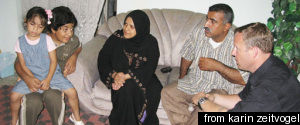
AMMAN, August 8, 2008 - Our taxicab was scaling a climb so precipitous that most taxi drivers in the Jordanian capital refuse to go up it.
But our cab driver, Omar, pressed the accelerator to the floor and urged his yellow taxi on. We crawled up the steep incline, struggled around a hairpin turn to the left and then continued to the left into a dead-end alleyway.
Two boys kicked a World Cup 2006 replica football back and forth between them at one end of the alley, and the skinniest of stray cats eyed our taxi, half with suspicion and half with hope that we might be bearers of scraps of food. Litter spilled from metal municipal bins and piles of sandstone rubble - ubiquitous in Jordan - clumped together at the sides of the alleyway.
Welcome to Jabal al-Jofa, one of Amman's poorest neighbourhoods, and home to Ahmed Thahir and his family, refugees from Iraq.
I had made the climb up the infamous hill that taxi drivers hate with Tyler Boudreau of Iraq Veterans' Refugee Aid Association and Paul Park, IVRAA's official photographer on the new association's first-ever mission. We had chosen Amman, Jordan as the venue of the mission, and tonight's visit was aimed at giving us greater insight into how the most destitute of refugees live.
That's why we had come to Jabel al-Jofa to visit Thahir, who fled the southern port city of Basra shortly before the US-led invasion of Iraq in March 2003, his wife and two sons in tow, hear his story and, we hoped, give him a glimmer of hope that things can and will get better.
"We left Basra because we sensed that something bad was going to happen," Thahir said, after he had welcomed us into the tiny apartment the family now calls home.
The only window to the room has been bricked shut. There is only a ceiling fan that clicks noisily on each revolution, for ventilation. The entire family sleeps in the only other room of the flat in a building perched atop the hillside that our taxi had struggled up.
The Thahirs live on hand-outs from acquaintances and charities, and on unquenchable hope that endures despite setbacks and difficulties beyond the imagination of your average American or European.
One of the two boys who fled with Ahmed and Lina from Basra died in Jordan "due to poverty," his anguished father said.
The other son, 12-year-old Arshad, is blind in one eye and hard of hearing. Lina believes that her two sons were born with congenital defects because she had been exposed to radioactive material left in Basra during the 1991 Gulf War.
The Thahir's five-year-old daughter Adian, who was born in Jordan, has had seven operations to correct an intestinal defect.
Several of the operations were botched: in one, surgical clips were left inside the little girl and had melded into the intestinal wall by the time she was cut back open to have them removed. In another, the doctors accidentally removed one of her ovaries. In another, they scratched her womb lining, her parents said.
In addition to the agony of seeing their children suffer, the Thahirs were lumbered with sizeable medical bills, which they could not pay.
"We are unable to afford medication and medical fees. We lost our other son due to extreme poverty. For our daughter's operation, we collected the money we needed through donations," Thahir said.
Their calls for help for their children have gone largely unheeded.
"When I sought treatment for my son here, I was told there's no treatment here, only abroad," said Lina.
"But it's been one year since I applied to the UNHCR to seek medical care abroad for him, but I've had no reply," she said.
Outside, a muezzin intoned the Muslim call to prayer. His call to the faithful wafted into the small room as the fan creaked and clicked on the ceiling.
I asked a question, putting it first through our interpreter: how did the Thahirs see Tyler, a veteran of the war they fled who was now in Amman to try to help them?
"Because he came here for this mission, we can forgive him," said Thahir.
Then, the questions began flowing in the other direction - towards Tyler - as Nadia, an Iraqi nurse who does volunteer work among refugees, asked whether Tyler had volunteered to fight in Iraq, or been pressured to go.
The former Marine captain spoke openly and candidly.
"I was in the Marine Corps for a very long time. I was a military career man. I had been in the Marine Corps for 10 years before the war in Iraq. And I did volunteer," Tyler replied.
There was a palpable silence. Even the muezzin outside had stopped. The only sound in the room was the clicking of the ceiling fan.
Nadia said: "Did you believe in the war?"

And Tyler responded: "When we left, our commanders and leaders told us that we were going to help the Iraqi people. That was the very clear message. And I believed in that message.
"When I discovered we were hurting more than we were helping, I got out. I left."
"Bless you," said Nadia. "We thank God that you came back safely from Iraq."
I dissolved into tears. Part of IVRAA's mission to heal the wounds of war had been accomplished.